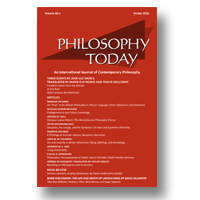|
|
|
21.
|
Philosophy Today:
Volume >
63 >
Issue: 4
Rowan Bailey
Sculptural Plasticity
abstract |
view |
rights & permissions
| cited by
This essay explores “sculptural plasticity” through neuronal matterings of the brainbody in philosophy, literature, and art. It focuses on Socrates’s cataleptic condition as evidenced in Plato’s Symposium, the plasticities at work in Jean-Paul Sartre’s Nausea, and morphogenetic acts of cell formation in the sculptural installation of Pierre Huyghe’s After ALife Ahead.
|
|
|
|
|
|
|
22.
|
Philosophy Today:
Volume >
63 >
Issue: 4
Helen Palmer
Speculative Taxonomies
abstract |
view |
rights & permissions
| cited by
Why might alternative taxonomies be needed in contemporary life, and how might the notion of categorisation or anti-categorisation be thought speculatively? This essay considers some of the ways that life and matter have been historically divided and segmented and asks how this might be rendered mobile, offering new divisions and definitions for those who exist outside hegemonic segments or scales.
|
|
|
|
|
|
|
23.
|
Philosophy Today:
Volume >
63 >
Issue: 4
Jan Overwijk
Autopoietic System
abstract |
view |
rights & permissions
| cited by
This essay presents, first, a description of Niklas Luhmann’s notion of autopoietic system. Luhmann theorises society as a self-referential, differential, and posthuman communication system that constitutes meaning. Then, second, it defends Luhmann against the new materialist challenge that stresses the role of matter in meaning-making.
|
|
|
|
|
|
|
24.
|
Philosophy Today:
Volume >
63 >
Issue: 4
Jason Tuckwell
Technē
abstract |
view |
rights & permissions
| cited by
This essay re-problematises the Aristotelian concept of techne in terms of the mathematical function to demonstrate the centrality of agency in technics. This schema animates computational theory as an agential operator or computer, to situate agency’s necessity to the technical apparatus and the production of abstract relations.
|
|
|
|
|
|
|
25.
|
Philosophy Today:
Volume >
63 >
Issue: 4
A. J. Nocek
Transcendental Biology
abstract |
view |
rights & permissions
| cited by
This essay shows how Conrad Hal Waddington is at the very center of divergent genealogies of theoretical biology: he is at once remembered for his contribution to epigenetics and complex systems biology (in its current formation) and largely forgotten for the debt that he owes to Alfred North Whitehead’s philosophy of organism. The essay traces Waddington's debt to Whitehead and demonstrates the way in which this conceptual lineage challenges the transcendental conditions of biological knowledge presupposed by the reigning paradigm of complex systems biology.
|
|
|
|
|
|
|
26.
|
Philosophy Today:
Volume >
63 >
Issue: 4
Rosi Braidotti
Transversal Posthumanities
abstract |
view |
rights & permissions
| cited by
Transversal Posthumanities emerge within the posthuman convergence of posthumanism and postanthropocentrism. Environmental, medical, and digital humanities reposition academic practice towards advanced technologies and climate change issues. A neomaterialist theoretical framework will help distinguish different kinds of Posthumanities: from the profit-oriented knowledge production practices of cognitive capitalism, to community-driven, non-profit experiments with minor knowledges.
|
|
|
|





